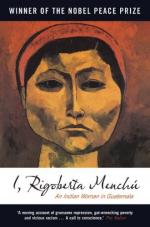|
This section contains 598 words (approx. 2 pages at 400 words per page) |

|
Stoll asserts that anyone who subscribes to a historical view of the origins of army violence by dating it to the 1960s or to elite fears generated by land reform and the mobilization of workers and peasants during the 1944-1954 reform movements (violently brought to an end through a CIA-supported coup) and anyone who believes that poverty, discrimination, repression, and inequality created fertile ground for revolution has "bought into" the URNG line. Human rights agencies, solidarity organizations, the United Nations, European governments, scholars, religious people, and ordinary citizens have fallen for this URNG-propagated myth, Stoll believes, because Rigoberta's testimony has given it credibility.
But this version of history, in one form or another, is also shared by many Guatemalans, including those not necessarily sympathetic to the revolutionary movement. Guatemala's foreign minister, who recently spoke at my university, for example, cited poverty, discrimination, political repression, inequality, and a...
|
This section contains 598 words (approx. 2 pages at 400 words per page) |

|




